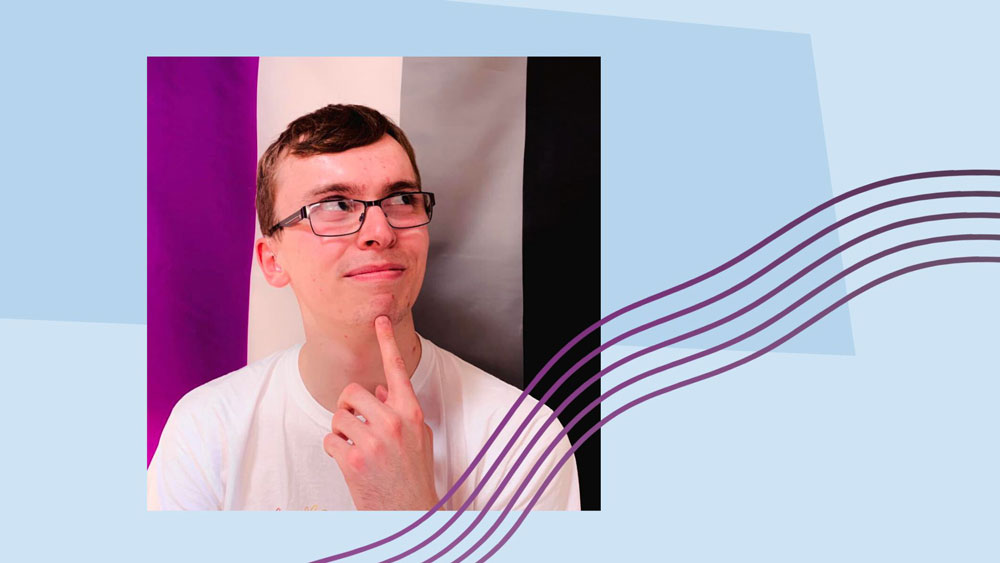The validity of questioning and the power of community
By Liam O’Dell | @liamodelluk
There was a bit of anxiety in me as I held up a disability charity’s banner in a march during London Pride in 2019. To be absolutely clear: it wasn’t any unease at the people or atmosphere on the glorious July day – as they were both vibrant and welcoming – but rather a fear that I may well have been a straight man leading my group’s procession when it wasn’t really my place to do so.
Of course, straight allies are vital, necessary, and welcome, and I saw myself as one (though I am of the view that ‘ally’ is a term which can only be bestowed upon you by others from that community, and not by yourself), but I knew full well the ongoing issue around straight people centring themselves in Pride or seeing it as a party, when it is anything but.
Though at this point, I was flirting with something – an identity of which I had been made aware through confident, proud, and passionate friends of mine: asexual. For those unfamiliar with the term, it refers to someone who experiences little-to-no sexual attraction.
At the time, I knew that I shuddered at the thought of sexual intercourse. Back in 2019, it was only a few years prior that my young, undiagnosed, autistic self had come to understand why kissing was a thing which romantic partners liked to do. Trying to wrap myself around the idea of sex for pleasure was one of the social concepts I decided to put in a mental box to unpack later.
I’d get round to it, I’m sure.
Yet the identity of ‘asexual’ sure did feel comfortable. After all, I identified with the idea of being ‘sex-repulsed’ – which means the individual is completely averse to the idea of having sex themselves (but is, of course, accepting of anyone else who would rather have fun in the bedroom). That sure sounded like me, although not every asexual person identifies as such.
But the typical, dismissive comments from people in my life would cast doubt on it all. I would be told that it’s just a matter of ‘finding the right person’, and then I assume my sexual attraction would turn on like a light switch or catch me by surprise while going out shopping.
I jest, but these comments have an impact. As I was questioning my identity, and processing all of the information I had in hand to suggest why I may or may not be ace, remarks which suggested it was a phase or something subject to change didn’t help the matter.
And going back to the London Pride situation, I was wrong to panic about being a straight person leading a procession during a Pride march, because I was questioning – ‘questioning’ being one of the Qs in the main LGBTQ+ initialism alongside ‘queer’.
That’s one thing which is worth stressing: that even questioning is valid, and you can sit with that for as long as is required. 2019 wasn’t the first time I came across the term asexuality, and it was brewing away in the back of my mind for a little while before I walked down the streets of London, and that’s okay. I just didn’t realise, at the time, how welcoming the community was of individuals who were questioning their sexual identity.
Also, when I say “community”, I should really be saying “communities”, because as I marched with a disability charity, a lot of my Deaf friends who were there validated a lot of my feelings at the time too.
I often tell those new to an identity to find your own community who share that label – more so because they can help you find confidence and understanding – but perhaps I didn’t realize until now, in retrospect, that they can help with other identities too, seeing as intersectionality is very much a thing.
It’s one thing having a community which can connect with one aspect of your identity, but when they can understand the nuances that come with intersectionality, then the value increases tenfold.
It did in my case, as conversations with Deaf friends at London Pride gave me the confidence to come out as asexual later that day. I knew that I didn’t immediately experience sexual attraction when I looked at someone I admired, and whether I would or wouldn’t one day, that still placed me on the asexual spectrum.
And thus, I came out – in a Five Guys, of all places.
All of this is to say that while there is ableism in the LGBTQ+ community (not least in the asexual community) and queerphobia in the disabled community, know that questioning is valid, and both communities have people in them who are willing to offer you patience and time to help you figure things out.
